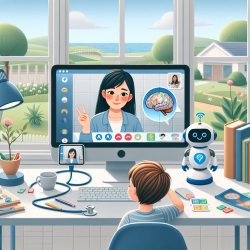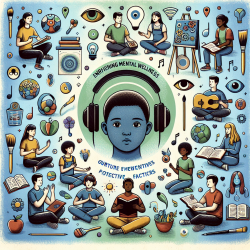In the ever-evolving landscape of education and therapy, many educational psychologists might find themselves feeling lost in the transition to working from home. The shift to telehealth services, however, offers a unique opportunity to not only adapt but to thrive. At TinyEYE, we understand the challenges and rewards that come with providing online therapy services to schools. Let's explore how you can turn these challenges into triumphs and create great outcomes for the children you serve.
Creating a Productive Home Workspace
One of the first steps to thriving while working from home is establishing a productive workspace. Here are some tips to help you set up an environment that promotes focus and efficiency:
- Designate a specific area: Choose a quiet, comfortable space in your home that is free from distractions. This helps in creating a clear boundary between work and personal life.
- Ergonomics matter: Invest in a good chair and desk setup to support your posture and reduce physical strain.
- Organize your tools: Keep your therapy materials, notes, and technology organized and within reach to streamline your sessions.
Leveraging Technology for Effective Therapy
Telehealth platforms like TinyEYE offer a plethora of tools to enhance your therapy sessions. Here’s how you can make the most of these technologies:
- Interactive tools: Utilize interactive games and activities to engage children during sessions, making therapy both fun and effective.
- Data tracking: Use data tracking features to monitor progress and tailor your approach based on each child's needs.
- Communication features: Leverage video conferencing and messaging tools to maintain clear and consistent communication with parents and teachers.
Maintaining Work-Life Balance
Working from home can blur the lines between professional and personal life. Here are some strategies to maintain a healthy balance:
- Set a schedule: Establish a routine that includes specific work hours and breaks to ensure you have time to recharge.
- Take care of yourself: Prioritize self-care activities such as exercise, hobbies, and socializing to maintain your well-being.
- Disconnect after work: Once your workday is over, step away from your workspace and engage in activities that help you relax and unwind.
Connecting with Colleagues and Clients
Feeling isolated can be a common issue when working from home. Here’s how you can stay connected:
- Virtual meetings: Schedule regular virtual meetings with colleagues to discuss cases, share insights, and offer support.
- Online communities: Join online forums and professional groups to network with other educational psychologists and stay updated on industry trends.
- Client check-ins: Maintain regular check-ins with clients to build rapport and ensure they feel supported.
Embracing Flexibility and Growth
The transition to telehealth and working from home can be an opportunity for professional growth and flexibility. Here’s how you can embrace this change:
- Continuous learning: Take advantage of online courses and webinars to expand your skills and stay current with best practices in telehealth therapy.
- Adaptability: Be open to experimenting with new techniques and approaches to find what works best for you and your clients.
- Positive mindset: Focus on the benefits of telehealth, such as increased accessibility for clients and the ability to work from the comfort of your home.
At TinyEYE, we believe that educational psychologists have the power to create significant, positive impacts on children's lives, even in a virtual setting. By embracing the tools and strategies available through telehealth, you can overcome the feeling of being lost and find your path to success. Together, let's turn the challenges of working from home into opportunities for growth and inspiration.










